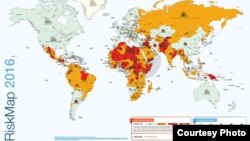Terrorism, corruption, a precarious judiciary and the upcoming general elections are some of the key risks of doing business in Kenya, according to Control Risks, a global consultancy firm that has released its “RiskMap 2016” report.
The report highlights what the firm considers some of the most significant trends in global risk for both public and private organizations.
East Africa senior analyst Paul Gabriel said during Wednesday’s report launch that the perception of East Africa as being negatively impacted by terrorism affects the business community and the region’s economy.
“But there isn’t always a well-understood differentiation between different parts of Kenya,” said Gabriel. “So you might have a company operating in Nairobi and therefore being perhaps not so much exposed as a company operating along the Somali border. But an outside client, an outside customer might not necessarily understand that.”
However, Gabriel emphasized that that these current dynamics may change, as terrorist groups alter their tactics.
“Just because those groups don’t operate in the big economic hubs of East Africa right now doesn’t mean that their evolution will not lead to them becoming strong enough to regain that capability again,” Gabriel said.
Control Risks East Africa Senior Managing Director Daniel Heal said that terrorism is not going away.
“The actual terror attacks aside, a major concern to businesses is the threat of these attacks which has the effect of deterring foreign investors from entry, investment or partnership with Kenya or Kenyan companies,” Heal said.
WATCH: RiskMap 2016 video
Election-Year Effects
Control Risks analysts say that politicians are increasing their anti-graft rhetoric ahead of the 2017 elections -- but that rhetoric may not lead to results if those candidates win office.
“So we find that more and more politicians, more and more presidents are being elected on an anti-corruption campaign,” said Gabriel. “At the same time, we see that those vested interests, those interests that exist in the political and the business environment, mean that actual progress in combating corruption is still very slow.”
The report’s findings suggest that Kenya’s 2017 national and local elections will be "highly contested" and will likely result in the recruitment of youth gangs and militias, heightened ethnic tensions and pressure on companies to meet local demands for benefits like employment and development.
While Kenya's last elections in 2012 were relatively peaceful, the disputed presidential election in 2007 set off weeks of riots and ethnic violence that killed more than 1,100 people.

